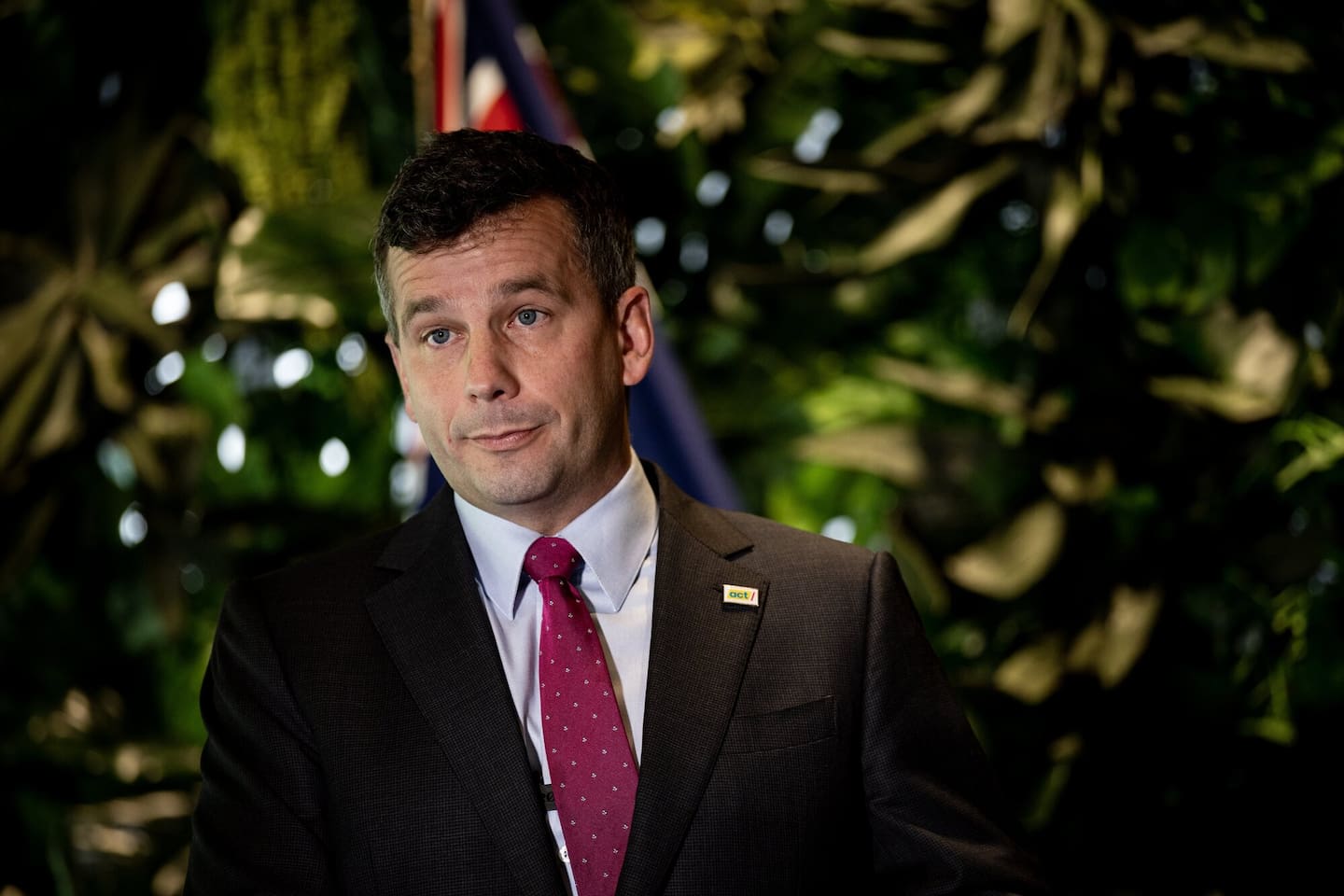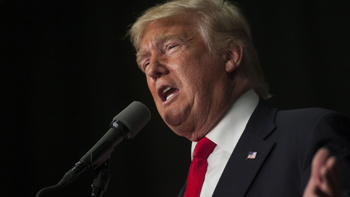David Seymour says the Oxford Union debate on the topic of “no one can be illegal on stolen land” was “great fun” despite his side losing.
The Act Party leader told the Herald there was a contrast between “the high level of respectful debate and respect for free speech here at the Union and what Te Pāti Māori have tried to do with our Parliament”.
Seymour, who is also Deputy Prime Minister but participated as a private citizen, said it was “reprehensible” that Te Pāti Māori co-leader Rawiri Waititi brought a noose into Parliament yesterday during the debate on the Privileges Committee report.
The Oxford Union debate is best known in New Zealand as the setting in which former Prime Minister David Lange argued in 1985 that nuclear weapons were morally indefensible. It was here he delivered his iconic line about smelling uranium on his opponent’s breath. Last year, Labour’s Willie Jackson took part.
Seymour was invited to participate in this week’s debate on the opposing side to the moot that states “no one can be illegal on stolen land”. He was joined by R.J. Hauman, an American immigration enforcement expert, and Art Arthur, a fellow of the United States-based Centre for Immigration Studies.
Their opponents, who were speaking in favour of the moot, were Aviva Chomsky, a US history professor and daughter of Noam Chomsky; Nivine Sandouka, a Palestinian human rights activist and member of the Alliance for Middle East Peace; and Australian senator Mehreen Faruqi.
Speaking to the Herald from Britain after the debate on Friday morning (NZ time), Seymour said that when he received the invitation he was told “people would listen politely, but I didn’t have a hope in Hades of winning”.
“Both of those things turned out to be true, but it was closer than anyone thought, and some of the organisers told me I pulled it back at the end. I was thrilled with the debate.”
 David Seymour was on the opposing side of the debate on Friday morning (NZT). Photo / Dean Purcell
David Seymour was on the opposing side of the debate on Friday morning (NZT). Photo / Dean Purcell
He called it “great fun”, but there was also a “level of hatefulness that came out”, referencing one of his opponents who he said was critical of “white immigration to Australia”.
The Oxford Union doesn’t livestream its debates – videos of the speeches are expected to be made public at a later date – but Seymour said those arguing for the moot “opposed the success of a lot of countries like New Zealand”.
“[They] tried to explain our success as being built on theft. What I tried to argue was the question is not what happened in the past, but how we deal with it today,” he said.
“The only way to do that is to make the most of each day and try and find a better way forward. I was proud to use the example of New Zealand as a country that has meticulously studied its history and redressed past wrongs through the Treaty Settlement process.”
He said New Zealand took in a large number of migrants every year and “our country works as a beacon of what a tolerant, pioneering society can be”.
“We can either spend our lives meditating on the failures of the past and try to outcompete each other in showing we care more, or we can ask ourselves how we can make a better world.
“In my view, that requires countries, who have the right to make laws, and if they make good laws, they’ll succeed, more people will want to go there, and fewer will leave, and other countries will copy them. If they make bad laws, the opposite happens.”
Seymour said the audience was hostile to one of the speakers on his side and “generally very favourable” to his opponents.
“But I thought I got a very quiet and thoughtful response. People were clearly listening, and that is exactly what I intended to do ... pull people back to our side.”
 Te Pāti Māori co-leader Rawiri Waititi holds up a noose in Parliament during debate on haka sanctions. Photo / Jamie Ensor
Te Pāti Māori co-leader Rawiri Waititi holds up a noose in Parliament during debate on haka sanctions. Photo / Jamie Ensor
‘Contrast’ to Te Pāti Māori actions
He said the debate presented a “contrast” to what had happened recently in New Zealand’s Parliament.
Seymour was in Britain as the New Zealand Parliament yesterday debated the recommendations of the Privileges Committee on three Te Pāti Māori MPs found to have acted “in a manner that could have the effect of intimidating a member of the House in the discharge of their duty”.
This relates to the MPs engaging in a haka, leaving their seats, and approaching members of the Act Party during the voting process on the first reading of Seymour’s controversial Treaty Principles Bill. Te Pāti Māori co-leader Debbie Ngarewa-Packer was accused of using a hand gesture similar to a finger gun, though she’s disputed that interpretation.
Parliament voted in favour of suspending Hana-Rawhiti Maipi-Clarke (for seven days), and Ngarewa-Packer and Waititi (both for 21 days). The vote was not unanimous, with government parties in favour and the Opposition against.
Seymour made mention of his Act colleague Nicole McKee’s contribution to the debate. Part of her speech was about how MPs were sent to Parliament to speak.
“Not to get out of your seats and start going up to other members of the House and trying to intimidate them with your stupid little fingers,” McKee said.
“Why don’t you put your brain into gear, get some words in your mouth, and start debating. Because that’s what you do in this Whare.”
 Act's Nicole McKee was critical of Te Pāti Māori in her speech. Photo / Mark Mitchell
Act's Nicole McKee was critical of Te Pāti Māori in her speech. Photo / Mark Mitchell
The Act leader said Waititi bringing a noose into Parliament to hold up during the debate was “absolutely reprehensible”.
“It may be that if all the other incidents weren’t enough, that may be the one that has voters in the Māori electorates saying, ‘you know what, we agree there’s grievances and problems, but we did not sign up for this’.”
He said he was with another New Zealander in the UK when they read about the noose.
“They were just apoplectic. They couldn’t believe that this was happening in our Parliament. I just despair.”
When Waititi raised the noose in Parliament yesterday, he spoke about how Te Pāti Māori MPs felt they were being silenced by the proposed suspensions.
“The silencing of us today is a reminder of the silencing of our ancestors of the past, and it continues to happen today – 21 days of silence.
“This may be confronting, but this is a reality for our whānaus. This is the reality for the people who descend from tīpuna, who are wrongfully accused because you interpreted something. Interpretation is a feeling, it’s not a fact. And so you’ve interpreted different things to mean that we were violent, and you’re making this out to your voters that we’re violent. We haven’t created the violence here. And now you’ve traded the noose for legislation.”
After the vote, the co-leaders vowed to “continue to be the voice that our people expect us to be”.
“We’ve heard the kōrero and now we’ve got to go home and show that we stood our ground,” Ngarewa-Packer said.
Jamie Ensor is a political reporter in the NZ Herald press gallery team based at Parliament. He was previously a TV reporter and digital producer in the Newshub press gallery office. In 2025, he was a finalist for Political Journalist of the Year at the Voyager Media Awards.
Take your Radio, Podcasts and Music with you









